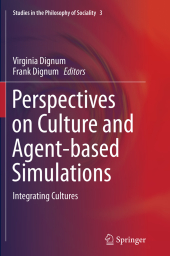 Neuerscheinungen 2016Stand: 2020-02-01 |
Schnellsuche
ISBN/Stichwort/Autor
|
Herderstraße 10
10625 Berlin
Tel.: 030 315 714 16
Fax 030 315 714 14
info@buchspektrum.de |

Frank Dignum, Virginia Dignum
(Beteiligte)
Perspectives on Culture and Agent-based Simulations
Integrating Cultures
Herausgegeben von Dignum, Virginia; Dignum, Frank
Softcover reprint of the original 1st ed. 2014. 2016. vi, 249 S. 55 SW-Abb. 235 mm
Verlag/Jahr: SPRINGER, BERLIN; SPRINGER INTERNATIONAL PUBLISHING 2016
ISBN: 3-319-37823-6 (3319378236)
Neue ISBN: 978-3-319-37823-7 (9783319378237)
Preis und Lieferzeit: Bitte klicken
Working from a computation perspective, this book explores how a culture may arise, develop and evolve through time. Covers modeling of culture, group and organisation culture, culture simulation and culture-sensitive technology design.
This volume analyses, from a computational point of view, how culture may arise, develop and evolve through time. The four sections in this book examine and analyse the modelling of culture, group and organisation culture, culture simulation, and culture-sensitive technology design.
Different research disciplines have different perspectives on culture, making it difficult to compare and integrate different concepts and models of culture. By taking a computational perspective this book nevertheless enables the integration of concepts that play a role in culture, even though they might originate from different disciplines.
Culture is usually regarded as something vague and qualitative and thus difficult to deal with in a computational and formal setting. Taking a computational approach to culture thus encompasses a twofold risk: taking a too simplistic approach to cultural influence on behaviour; or trying to capture too much, hence not leading to useful computational tools. However, the approaches and insights in this collection show how different perspectives by leading researchers described in thirteen chapters still can form a coherent picture. The book thus illustrates the potential of using computing systems to better understand culture.
By describing methods, theories and concrete application results about the integration of cultural aspects into computer systems, this book provides inspiration to researchers of all disciplines alike and presents the start of an interdisciplinary dialogue on culture.
Chapter 1. Integrating Cultures: An Introduction; Virginia Dignum and Frank Dignum.- Part 1. Analysis and Modelling of Culture.- Chapter 2. Modelling Culture with Complex, Multi-dimensional, Multi-agent Systems; Alexis Morris, William Ross, Hadi Hosseini and Mihaela Ulieru.- Chapter 3. Cross-validation of Gaming Simulation and Multi-agent Simulation; Gert Jan Hofstede , Catholijn M. Jonker, and Tim Verwaart.- Chapter 4. Modelling Culture through Social Activities; Rubén Fuentes-Fernández, Jorge J. Gómez-Sanz, and Juan Pavón.- Part 2. Group and organisation culture.- Chapter 5. Cultural Integration and Differentiation in Groups and Organisations; Michael Mas, Andreas Flache, and James A. Kitts.- Chapter 6. Modelling and Analysis of Safety Culture of Air Traffic Organizations in the National Culture Context; Alexei Sharpanskykh and Sybert H. Stroeve.- Chapter 7. Monolingual Biases in Simulations of Cultural Transmission; Sean Roberts.- Part 3. Culture Simulation.- Chapter 8. Towards Agent-Based Models of Cultural Dynamics: A Case of Stereotypes; Jens Pfau, Yoshihisa Kashima and Liz Sonenberg.- Chapter 9. Matching and Mismatching Social Contexts; Bruce Edmonds.- Chapter 10. The Role of Stability in Cultural Evolution: Innovation and Conformity in Implicit Knowledge Discovery; Joanna J. Bryson.- Part 5. Culture-Sensitive Technology Design.- Chapter 11. Socially-Oriented Requirements Engineering - Software Engineering Meets Ethnography; Sonja Pedell, Tim Miller, Frank Vetere, Leon Sterling and Steve Howard.- Chapter 12. Cultural Broker Agents: A Framework for Managing Cultural Misunderstandings; Omar Gonzalez, Jean-Paul Barthes, and Felix Ramos.- Chapter 13. Culture Driven Game Design Method: Adapting serious games to the players´ culture; C.J. Meershoek, R. Kortmann, S.A. Meijer, E. Subrahmanian and A. Verbraeck.


